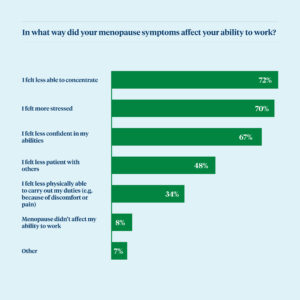The facts
Every woman or person who has a menstrual cycle will experience menopause. It is a natural and unavoidable stage of life. Menopause can also impact trans and non-binary people who may not identify as female and can happen earlier naturally or for reasons such as surgery to remove the ovaries or uterus or cancer treatments.
According to the House of Commons Women and Equalities Committee’s ‘menopause and the workplace’ survey; 99% of people who go through menopause experienced at least one menopausal symptom. Symptoms range from cognitive, physical, and psychological difficulties, and can include:
- hot flushes (sometimes followed by chills)
- heart palpitations
- fatigue
- sleep disturbance
- dry eye condition
- muscular aches
- headaches
- night sweats
- skin irritation
- irritability, anxiety and/or mood disturbances
- poor concentration
Alarmingly, 69% reported suffering from anxiety or depression, 70% reported increased stress, 67% reported feeling a loss of confidence and 92% of people reported that these symptoms affected them at work.

What do employers need to consider?
Menopause is a health and wellbeing consideration for employees. Being aware of menopause, its symptoms and effects is the first step in managing the health and wellbeing of employees. Helping them to continue doing their job confidently and effectively.
Having open and sensitive discussions with all employees of all gender identities will allow for a positive and supportive environment. This approach should also help prevent/lessen some of the psychological effects of menopause in the workplace.
Menopause and Discrimination
Menopause itself is not specifically mentioned in the Equality Act 2010. However, the EAT in Rooney v Leicester City Council concluded that symptoms relating to the menopause can amount to a disability under the Equality Act. This was on the basis that Mrs Rooney’s symptoms were found to be ‘more than minor or trivial’ and ‘long term’. The case of Rooney v Leicester City Council is as a warning to employers that failure to notice and address symptoms of menopause can result in liability under the Equality Act.
In addition, if an employee is placed at a disadvantage or treated less favourably because of their menopausal symptoms; discrimination could arise if related to other protected characteristics (in addition to disability). For example, age and sex.
With this in mind, employers must ensure that steps, procedures, and support is in place to assist employees experiencing menopause. For example, at Capital Law we have a menopause policy in place addressing ‘what is menopause’, Capitals commitment to those experiencing menopause, workplace adjustments and resources.
If you are interested in putting a similar measure in place to support employees and colleagues, and protect against potential claims, please contact our Employment team for more information on how we can help.




